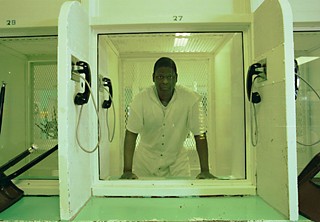Judge Recommends Rejecting Rodney Reed Appeal
Magistrate judge contends that DNA proves Reed's guilt
By Jordan Smith, Fri., June 29, 2012
In an 82-page report to District Judge Lee Yeakel, federal Magistrate Judge Andrew Austin on June 15 recommended that the federal appeal of Rodney Reed be denied. Reed was convicted and sentenced to die in 1998 for the 1996 murder of Stacey Stites, after DNA found on vaginal swabs taken from Stites were an affirmative match for Reed. "If Reed has no innocent explanation for the sperm found in ... Stites' vagina being his, then the DNA match is significant – indeed ... perhaps conclusive – evidence of his guilt," Austin wrote. Whether Yeakel will agree with that conclusion remains to be seen.
The state contends that Reed, while on foot, overcame 19-year-old Giddings resident Stites as she drove to Bastrop for an early morning shift at H-E-B, and that the semen found in Stites is the "Cinderella's slipper" proving its case. Reed's supporters contend that a far more likely suspect is Jimmy Fennell, a former Giddings and Georgetown cop to whom Stites was engaged at the time of her murder. Fennell is currently serving a 10-year sentence for kidnapping and sexual assaulting a woman while on duty and responding to a call for service as a Georgetown cop. Reed's case has been wending its way through state and federal courts on appeal since 1999, and, in the intervening years, a mass of evidence has come to light that paints Fennell as a man with a troubling history of violence toward women – a history that Reed's supporters say bolsters their contention that Fennell murdered Stites after discovering that she was having a sexual affair with Reed.
Moreover, Reed's supporters and his lead lawyer, Bryce Benjet, say that the reason the state's theory of the case convinced jurors of Reed's guilt is that questionable medical evidence, presented by the state to demonstrate that Stites had been raped just before her killing, was not scientifically sound and was never challenged by Reed's trial attorneys, an oversight that Reed has said made those attorneys ineffective. (In March, the U.S. Supreme Court ruled that a defendant should be allowed to argue ineffective assistance claims even if those issues were not raised at trial, so Benjet may next make that claim against former Reed appeal attorney Bill Barbisch for not arguing that Reed's trial attorneys were ineffective for failing to challenge the state's contention that Stites was raped.)
More than two years after the instant appeal was filed, federal Magistrate Austin recommended that it be denied. He concluded that Reed's claims of actual innocence are not persuasive, which further means that several other of Reed's arguments on appeal – including that his trial defenders were ineffective – are procedurally barred from consideration by the judge. "Reed cannot ... deny that he had sex with ... Stites," Austin wrote. "Thus, Reed's theory of innocence relies fundamentally on the assertion that he had consensual sex with Stites several days ... prior to her murder. Even if all of the other allegedly 'new' evidence of innocence is credited" – including details about Fennell's troubling history – "if this claim of a consensual sexual relationship is not one a reasonable juror would have believed, then Reed's entire claim of innocence falls apart, because other than consensual sex, the only rational explanation for how Reed's semen was in and on ... Stites' body is that he raped her."
On appeal, Reed raised exactly this point, bringing to bear the opinions of two well-respected experts, forensic pathologist Leroy Riddick and Tarrant County crime lab chief Ron Singer, who each concluded that there was no evidence at all that Stites was raped, but that there was evidence to conclude that the semen found in Stites was from a sexual encounter a day or more before she was killed. Riddick opined that DNA connected to Reed found elsewhere on Stites' body was likely due to contamination at the crime scene by officials who did not follow best practices for evidence collection. Interestingly, Austin's report does not mention Riddick or Singer, or any of the specifics of the defense's scientific case. Indeed, Austin does not appear to have considered that the DNA results do not prove that Stites was raped; he returns only to a conclusion that DNA is "incontrovertible" evidence of a "person having been at a particular place," and that in the absence of Reed being able to prove by some reliable means that he had a relationship with Stites – other than eyewitnesses who said they knew that Stites and Reed were having an affair, statements that Austin did not find credible – "the DNA evidence effectively condemns Reed."
Benjet wrote in an email that while he appreciates the "hard work put in by [Austin] in completing such a detailed and lengthy recommendation," he nonetheless believes that "in the two years since this case was briefed, some important details in this complex case were missed." And most important among those is that the state's medical experts "were not reliable," he wrote. "They gave opinions that were inconsistent with both the facts of the case and the established scientific studies. We presented to the court two prominent experts ... who both confirm that Ms. Stites was not raped, and that the evidence indicates that consensual sex between Mr. Reed and Ms. Stites may have taken place a day or more before she was killed." And although Austin seems to have passed over the meat of that evidence, he did nonetheless agree in the recommendation that such evidence "would have provided motive for Mr. Fennell to have killed Ms. Stites and pin the murder on Mr. Reed," Benjet wrote.
Austin's 82-page report will now be considered by Yeakel, who may sign off on Austin's recommendation or consider additional evidence. Benjet says he will ask Yeakel for a hearing on the case.
Benjet has just over a month to file with the court any objections he has to Austin's report. "We understand that Mr. Reed's case is both legally and factually complex, and we look forward to speaking directly with the district judge in this case," Benjet wrote in an email, "and presenting the important evidence demonstrating that Mr. Reed is innocent of this crime and entitled under the law to a new trial."
Got something to say on the subject? Send a letter to the editor.
The Chronicle has covered Rodney Reed’s case for nearly 20 years. For more, visit our Rodney Reed archive.











